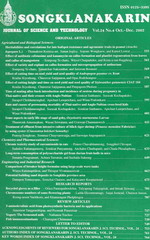ThaiScience
ThaiScience
SONGKLANAKARIN JOURNAL OF SCIENCE & TECHNOLOGY
Volume 42, No. 03, Month MAY, Year 2020, Pages 496 - 503
Self-reported inclination of heavy-duty vehicle drivers to adopt eco-driving in different motivation contexts
Nazam Ali and Mongkut Piantanakulchai
Abstract Download PDF
Eco-driving is an emerging field of research. Due to its positive dimensions on fuel-economy and environmental emissions, it is becoming a well-known concept in transportation industry. Behavioral responses of drivers’ readiness to adopt eco-driving are studied. Questionnaires are collected from 87 truck drivers working for a logistics firm in Thailand. Eco-driving was introduced using three different strategies; changing driving behavior, competition with fellow drivers, and reward or penalty systems. A five-point Likert scaling system is adopted to record their self-evaluation scoring to practice eco-driving in given contextual motivations. Results are reported in the form of eco-driving scores and Statistical evaluations to check if the difference in behavioral response is statistically significant. Statistically significantly different results showed that in-relationship (score 3.75) and high school drivers (score 4.38) manifested strong motivations in penalty or reward systems while high school drivers exhibited great inclinations in changing their driving behavior (score 3.89).
Keywords
co-driving, Thai drivers, co-driving score, behavioral response, motivation contextsSONGKLANAKARIN JOURNAL OF SCIENCE & TECHNOLOGY
Published by : Prince of Songkla University
Contributions welcome at : http://rdo.psu.ac.th
